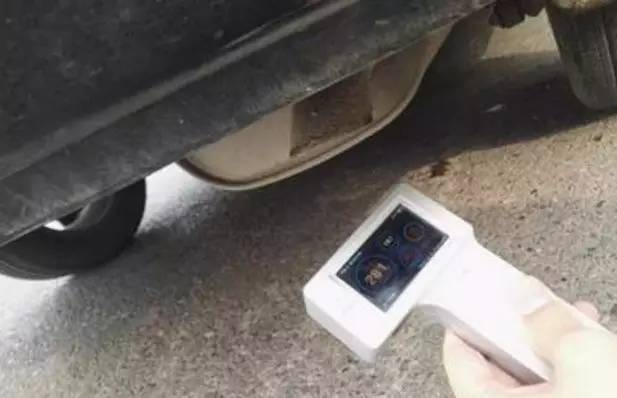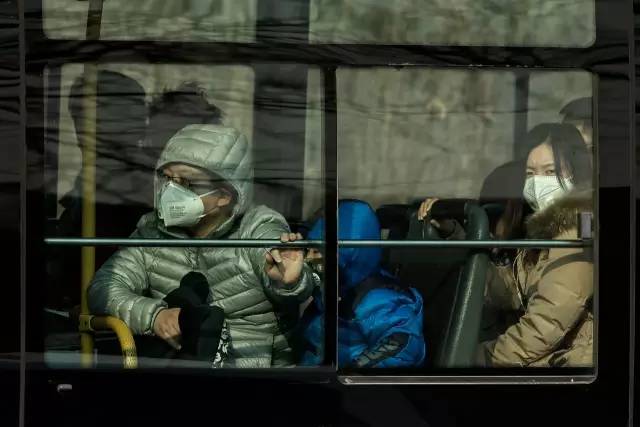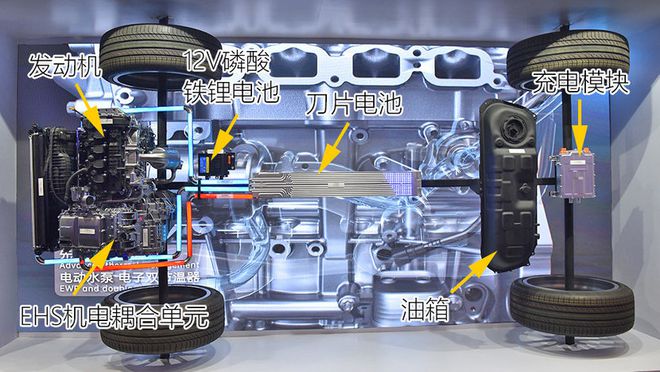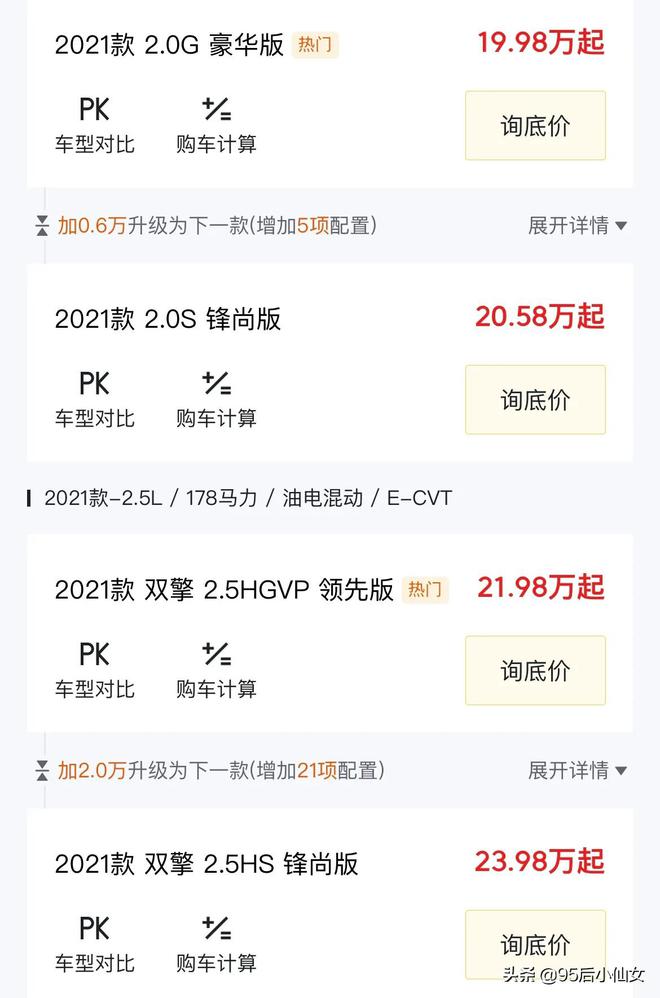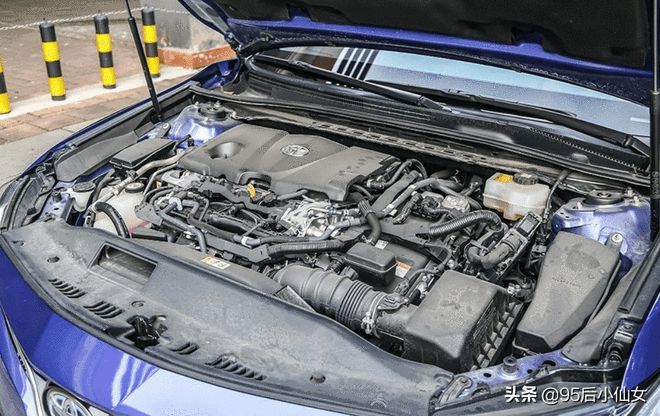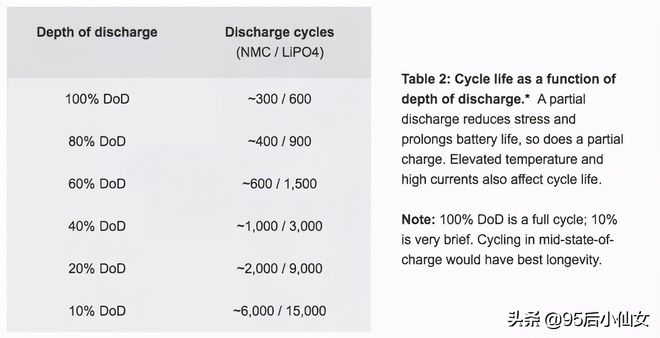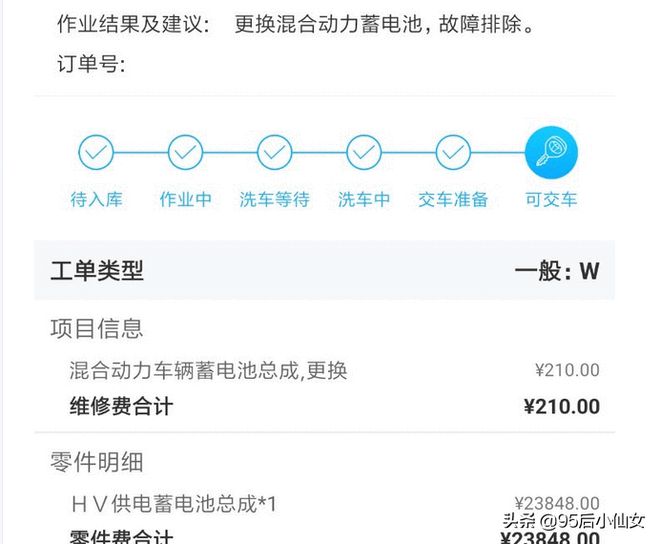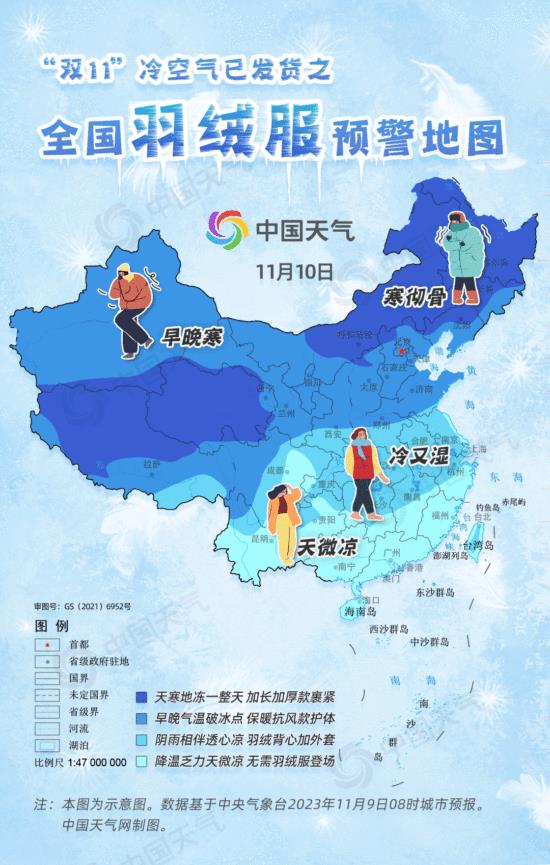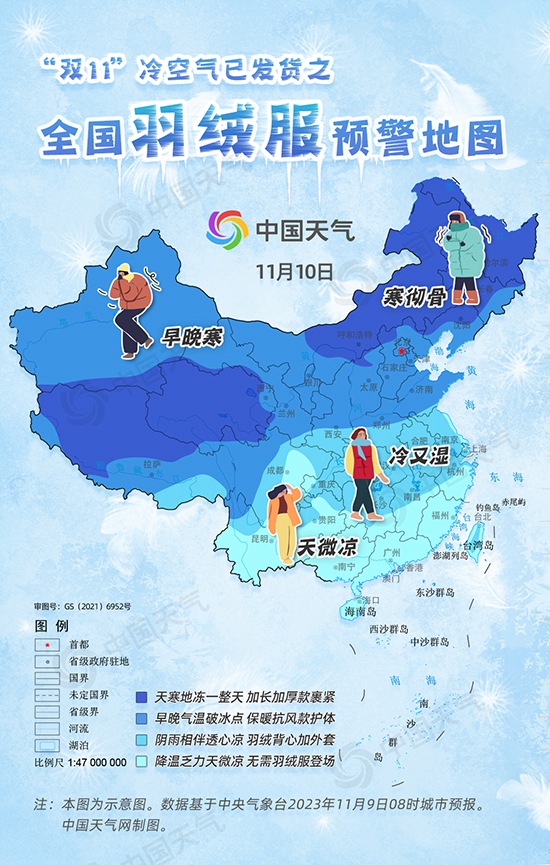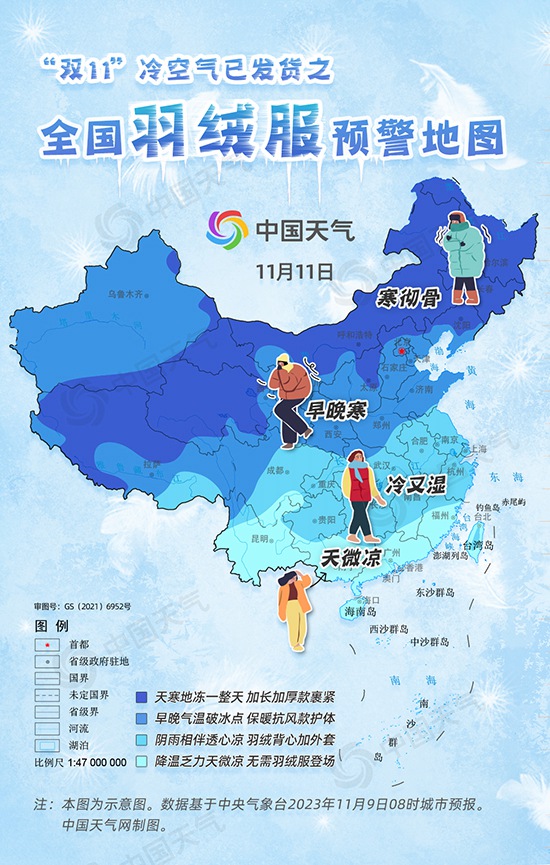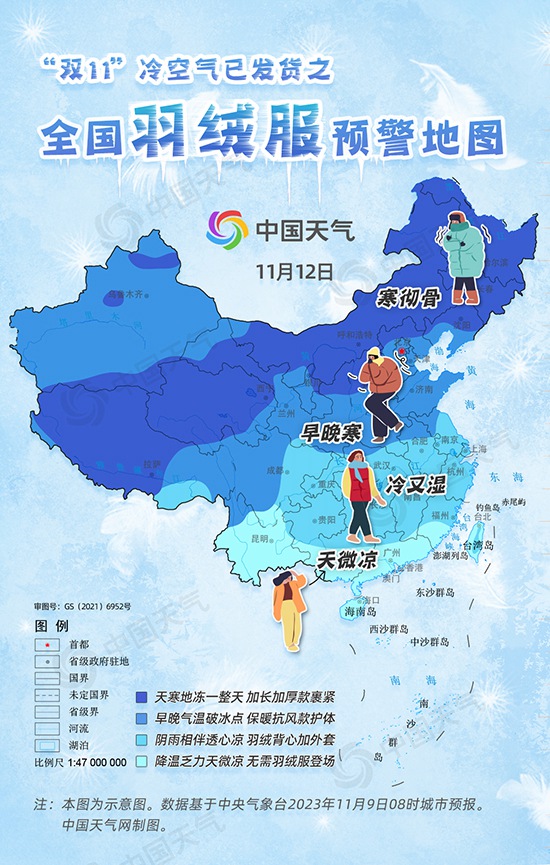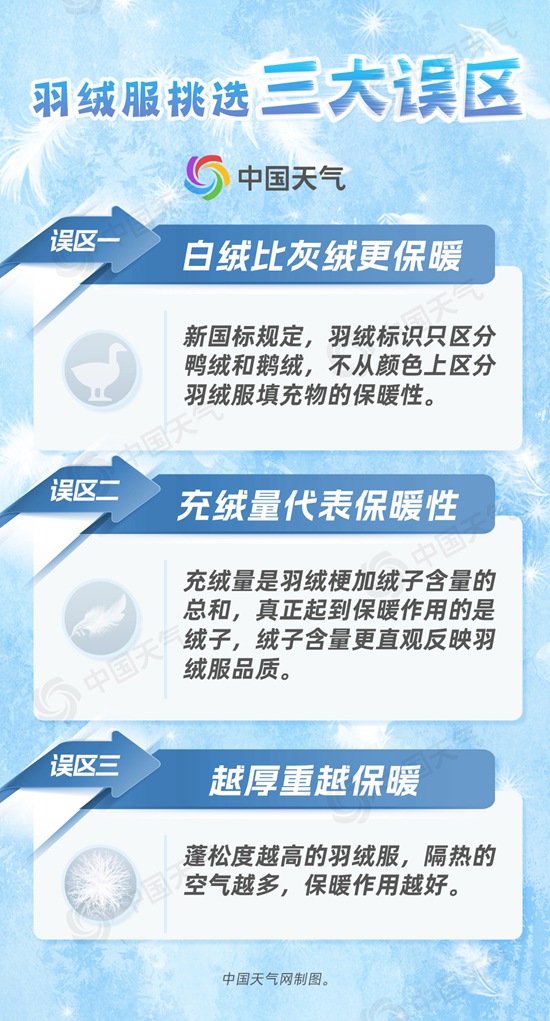China. com, December 16-Omicron mutant spreads quickly, is highly contagious and spreads invisibly. However, with the variation of the virus, the vast majority of infected people are mild or asymptomatic in clinical features. For people with mild and asymptomatic infections, people with no basic diseases or with stable basic diseases, they can take care of themselves at home. According to the "Guidelines for Home Treatment of Covid-19 Infected Persons" (hereinafter referred to as "Guidelines") issued by the State Council in response to the joint prevention and control mechanism of novel coronavirus epidemic, as well as the relevant tips from local CDC and medical experts, China. com combed the following 30 questions and answers, covering knowledge points such as protection, medication, medical treatment for key populations, vaccination, etc., to help the general public do a good job in personal protection and home treatment.
1. What should I pay attention to when I am infected with COVID-19?
The "Guide" clarifies that home therapists should take temperature measurement and self-health monitoring once every morning and evening. If symptoms such as fever and cough appear, they can take symptomatic treatment or oral medication. When necessary, you can also contact the medical staff of primary health care institutions or consult relevant medical institutions through Internet medical forms. Asymptomatic people don’t need medication. When taking medicine, home therapists should take it according to the drug instructions to avoid blind use of antibacterial drugs. If you have a basic disease, there is no need to change the dosage of the basic disease treatment drugs being used when the condition is stable. Antigen self-test and report the results according to the relevant epidemic prevention requirements.
If you have difficulty breathing or shortness of breath; After drug treatment, the body temperature remained higher than 38.5℃ for more than 3 days. The original underlying diseases are obviously aggravated and uncontrollable; Children have drowsiness, persistent refusal to eat, feeding difficulties, persistent diarrhea or vomiting; When pregnant women have symptoms such as headache, dizziness, palpitation, breath-holding, or abdominal pain, vaginal bleeding or bleeding, abnormal fetal movement, etc., they can be transferred to relevant hospitals for treatment by means of self-driving and 120 ambulances.
2. How to use medicine?
Reference Table of Commonly Used Drugs for Home Treatment of Infected Persons in Covid-19:
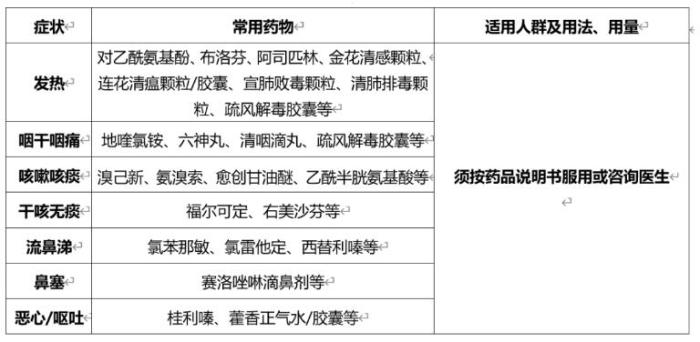
3. How to protect family members?
The Guide suggests that when you are at home, you should open doors and windows regularly every day to keep indoor air circulation. If you don’t have natural ventilation conditions, you can use exhaust fans for mechanical ventilation. Do a good job in ventilation and disinfection of shared areas such as toilets and bathrooms. Wash hands or disinfect hands when preparing food, defecating before and after meals, taking off masks, etc. Cover your nose and mouth with a tissue when coughing or sneezing, or cover your nose and mouth with the inside of your elbow, and throw the used tissue into the trash can. Do not share daily necessities with other family members. Tableware should be cleaned and disinfected after use. The surfaces of articles that may be contacted by home therapists and the towels, clothes and quilts they use should be cleaned and disinfected in time, and the personal belongings of infected persons should be placed separately.If the family shares the bathroom, the home treatment staff should disinfect it every time they use it; If family therapists use a separate bathroom, they can be disinfected once a day. Used paper towels, masks, disposable gloves and other household garbage are put into plastic bags and placed in special trash cans. Articles contaminated by saliva, sputum, etc. shall be disinfected at any time.
4. When can I end the home treatment?
The Guide makes it clear that if the symptoms of home-based therapists are obviously improved or have no obvious symptoms, the self-test antigen is negative, and the Ct value of Covid-19 nucleic acid detection for two consecutive times is ≥35 (the interval between the two tests is more than 24 hours), home-based therapy can be ended, and normal life and going out can be resumed.
5. What should I pay attention to when I go to the hospital?
Shen Ning, vice president of Peking University Third Hospital and director of the Center for Infectious Diseases: If you have fever and related respiratory symptoms and need to see a doctor, you should go to the fever clinic. When visiting a doctor, observe the relevant regulations of the hospital, especially self-protection, wear N95 mask regularly throughout the whole process, and comply with the relevant requirements of the hospital for nucleic acid and antigen. If you suspect that you have related upper respiratory symptoms and are worried about the risk of going to the hospital, you can choose online medical treatment, find experts in infectious diseases, respiratory medicine, Chinese medicine and related departments for consultation, and judge whether you need to go offline for medical treatment.
6. The emergency department and fever clinic can prescribe medicine for up to three days, but it hasn’t recovered after three days. Do you need to go to the hospital for reexamination?
Shen Ning: The self-limiting process of upper respiratory tract infection is about 5-7 days. Many patients’ symptoms are not completely relieved after 3 days. If the symptoms are relieved to a certain extent after 3 days of medication, there is no need to rush to return to the clinic. It is recommended to further observe the changes of symptoms. If the symptoms get worse, you must go to the hospital for a follow-up visit.
7. Can Chinese medicine and western medicine be taken together to treat Covid-19 infection? Can a variety of Chinese patent medicines be eaten together?
Liu Qingquan, President of Beijing Hospital of Traditional Chinese Medicine: At present, according to the research and clinical observation, Chinese patent medicines for treating COVID-19 and colds can be combined with western medicines such as antipyretic and analgesic drugs. Just to be on the safe side, Chinese medicine and western medicine should be separated by half an hour. If the ingredients of "Chinese patent medicine" used include drugs with western medicine for relieving fever and pain, attention should be paid to the combination of them, and side effects may occur after the drugs are superimposed. It is recommended not to combine several drugs, including traditional Chinese medicine and western medicine. As a result of combined use, there will be overlapping of drug doses, which has certain risks and will not improve the curative effect.
8. What traditional Chinese medicines can be selected?
Liu Qingquan: At present, all the Chinese patent medicines for treating colds and flu, especially those with wind-heat syndrome and external cold and internal heat (cold containing fire), have a very good effect on treating Omicron mutant.
9. How to protect pregnant women?
Qiao Jie, Dean of Peking University Third Hospital and Academician of China Academy of Engineering: If pregnant women’s family members are infected, they should be relatively isolated in space as far as possible if possible, and their living items should be separated as much as possible, and the bathroom should be disinfected, and the living space should be ventilated as much as possible. If a colleague is positive, try to work at home as much as possible. If you must work in the same space at the same time, pay special attention to the ventilation of the office space and wear N95 mask. Pregnant women should go to public places as little as possible, and do not get together or have dinner. Pay attention to hand hygiene while wearing a mask. Maintain balanced nutrition, adequate sleep and a positive and optimistic attitude. Pay attention to the standardized wearing of N95 mask when you go to the hospital for check-up, and reduce the waiting time. If you have any questions, you can consult in the form of online medical care.
10. What are the symptoms of pregnant women infected with Covid-19? Will it affect the fetus?
Qiao Jie: After the pregnant women were infected with Covid-19, the overall incidence, symptoms and course of disease were similar to those of the general population. The main symptoms were upper respiratory tract infection, such as cough, sore throat, sneezing, stuffy nose, runny nose, general aches and fever, and the severity was very few. The course of disease is basically 5-7 days, and the severe cases are mainly related to basic diseases, such as poor liver and kidney function, hypertension, diabetes, etc., which need to be treated in time. The mother has the protective barrier of placenta, so it is hardly transmitted to the fetus. However, if it is postpartum, it is best for Bao Ma to be isolated from the newborn or wear N95 mask to breastfeed.
11. How do pregnant women respond to symptoms?
Qiao Jie: When pregnant women have respiratory symptoms such as fever and dry cough, they can do nucleic acid test or antigen test to determine whether they are infected with Covid-19. Drink plenty of water, cool down physically, and choose traditional Chinese medicine available to pregnant women for symptomatic treatment. If western medicine is used to reduce fever, acetaminophen can be used for treatment if the temperature exceeds 38.5 degrees. When choosing antipyretic drugs, choose a single drug, and don’t stack it to reduce possible liver and kidney damage. Pay attention to monitoring heart rate, blood pressure and body temperature. Pregnant women in the third trimester should also pay attention to the monitoring of fetal movement, which can be monitored for one hour every day and have more than three fetal movements every hour. If the symptoms persist for more than 3 days, the fever does not improve after taking antipyretics, or fetal movement disappears, chest pain, chest tightness, abdominal pain, etc., you should contact the midwifery institution in time and see a doctor in time.
12. If COVID-19 is positive, can she give birth by herself?
Zhao Yangyu, director of the Department of Obstetrics and Gynecology, Peking University Third Hospital: Whether Covid-19 is infected or not, the choice of delivery mode is determined according to obstetric indications, and the doctor makes a comprehensive evaluation. For example, simple Covid-19 positive, no natural childbirth taboo (such as poor heart function, severe lung function, etc.), as long as you can tolerate the whole process of vaginal delivery, you can still choose natural childbirth.
13. What are the manifestations of children infected with COVID-19?
Qian Suyun, chief physician of Beijing Children’s Hospital: Most children mainly have fever, cough, runny nose and stuffy nose. Some of them are atypical symptoms, including fatigue, poor appetite, vomiting and even diarrhea. There are also some children who will have wheezing and hoarseness. However, the degree of children’s fever varies greatly from individual to individual, and some children can have a higher fever, even more than 39 degrees or 40 degrees. It is observed that most children have a fever in about 2-3 days. So the course of disease is about 3-5 days. The probability of serious illness is very low.
14. What medicines can families with children store?
Qian Suyun: Families with children should properly store some emergency drugs commonly used by children, but it is not recommended to store a lot of drugs. Improper storage may lead to children taking them by mistake. It is recommended to reserve drugs. The first category is antipyretic drugs. For children over 6 months, you can choose ibuprofen or acetaminophen, and one of them can be enough. Children between 2 months and 6 months are not suitable for ibuprofen, but acetaminophen can be used. For children within two months, it is not recommended to use antipyretic drugs routinely, and measures such as physical cooling can be taken and timely medical treatment can be taken. Cough is conducive to the discharge of respiratory secretions. Routine use of drugs is not recommended for children with mild cough. If there is nasal congestion and obvious cough, you can do atomization and wash your nose. At home, you can use a humidifier to increase the humidity in the air. If you have obvious cough, you can prepare some Chinese patent medicines for clearing heat and eliminating phlegm, and choose drugs suitable for your age, but don’t take two or more at the same time. Antipyretic drugs do not advocate taking the two drugs at the same time, and there is no need to take them alternately. Use drugs according to the age, dosage or doctor’s advice recommended in the instructions, and pay attention to the interval between two drugs. It is best for parents not to give drugs to their children according to their own experience or speculation. They can get medical advice and recommendations from professionals through the Internet.
15. Under what circumstances does the child need to be sent to a doctor?
Qian Suyun: The simplest way to distinguish is to look at the child’s mental state. If the child has fever and other symptoms, but he is in good spirits and can eat, drink and play after the fever has gone down, he can continue to observe and treat the symptoms at home. It is recommended to go to the hospital in the following situations: the fever lasts for more than 3 days and there is no sign of improvement; The child’s mental state is not good, including that the baby sometimes cries, is annoyed and is not easy to appease, and the older child is sleepy, listless and looks bad; In addition, cough is getting worse, which affects daily life and sleep; Some children wheeze, breathe faster, even have difficulty breathing, and have obvious hoarseness. Be careful of laryngitis and laryngotracheitis; If you have consciousness disorder or convulsion, you should see a doctor immediately. Children under three months are a special group, including newborns and infants. Once they have fever, it is recommended to see a doctor in time.
16. How should the elderly protect themselves?
Li Yanming, Director of Department of Respiratory and Critical Care Medicine, Peking Hospital: First of all, we should vaccinate, including whole-course vaccine and booster vaccine, which can obviously reduce the incidence of severe illness. Second, reduce going out, especially avoid going to closed places where people gather. If you really need to go out, wear a mask. Try to minimize contact with the external environment during the whole process, and wash your hands when you come back. Third, pay attention to keep warm while strengthening ventilation. You can put your elderly friends in another room and let them return to the room after the ventilation is over and the room temperature returns to normal. Fourth, to control basic diseases, we can buy medicines through various channels, or let relatives and friends buy medicines. Fifth, ensure regular sleep and nutrition, but don’t overeat. Reduce alcohol and tobacco as much as possible. Family members who don’t live with the elderly can reduce their visits and reduce the chances of virus exposure in the near future. If the co-residents are infected with Covid-19, they can live alone if conditions permit. If conditions do not allow, it is necessary to have an independent room, close the door and strengthen ventilation. Patients should be cleaned and disinfected after touching toilets, door handles and faucets.
17. What are the precautions for drug use in the elderly?
Li Yanming: After the elderly are infected with Covid-19, we should first strengthen observation and monitoring. Second, we should strengthen daily care, including light diet. After infection, the gastrointestinal function of the elderly is not good. It is recommended to eat less and eat more meals to avoid vomiting after eating a lot of food at one time. Ensure sleep; Replenish a proper amount of water, combined with body temperature and sweating, a small amount for many times, to prevent gastrointestinal discomfort and increase heart load caused by a large amount of water supplement at one time. Third, the higher the body temperature and the older you are, the more careful you should use drugs to prevent the elderly from sweating a lot after using a fever to cause collapse or even hypotension; In addition, the fever should be slowed down, and the fever can be reduced by physical means; Avoid using multiple drugs together when using antipyretics and cold medicines. Fourth, the application of proprietary Chinese medicines should be less and more precise, and multiple proprietary Chinese medicines with the same function should not be used at the same time. Fifth, the elderly with basic diseases should strengthen the management of basic diseases. A large amount of water loss caused by fever may lead to a decrease in blood pressure. During the fever, especially when antipyretics are used, pay attention to blood pressure monitoring. If the blood pressure is lower than the normal level, the antihypertensive drugs should be reduced or even stopped, and then used as usual when the blood pressure returns to normal. The elderly may eat little after infection, so it is necessary to monitor the changes of blood sugar to prevent hypoglycemia. When the elderly have fever and weakness, they must prevent falling.
18. Under what circumstances do you need to send the elderly to the hospital?
Li Yanming: We should strengthen the observation of the elderly and understand their basic situation. Such as basal heart rate, basal blood pressure, respiratory rate per minute and body temperature. For the elderly with cardiopulmonary diseases, it is necessary to know their basic peripheral oxygen saturation. Observe the changes of the general situation of the elderly, such as conscious state, mental state, defecation and eating. If the following situations occur, you need to consider seeking medical treatment: First, symptoms such as fever persist or tend to worsen. Second, there are new symptoms, such as chest pain, dyspnea, incontinence or sudden immobility of limbs, especially unilateral immobility of limbs, or inability of the elderly to eat, nausea and vomiting, or drowsiness, unconsciousness and disorientation. In addition, the aggravation of basic diseases, such as coronary heart disease in the elderly themselves, leads to angina pectoris; It turned out that there was chronic obstructive pulmonary disease or asthma, and there was an aggravation of chronic obstructive pulmonary disease and asthma, and they all needed to see a doctor.
19. What should cardiovascular patients pay attention to?
Zhou Yujie, Executive Vice President of Beijing anzhen hospital: Patients with original cardiovascular diseases are taking basic drugs. Drinking more water after high fever may affect the symptoms of heart failure, such as drugs for relieving muscle soreness and cardiovascular drugs. At present, no adverse effects between them have been found, so there is no need to be anxious. Manage the basic diseases of the heart well, use the original drugs for cardiovascular diseases well, increase the body’s immunity, improve their sleep quality and overcome anxiety. Don’t stop taking drugs for cardiovascular disease prevention and control for a long time. If you have persistent chest pain, seek medical advice promptly. Pay attention to keep warm, control the intake of sugar, oil and salt, and keep moderate exercise, not too intense. Monitor blood pressure, heart rate and blood lipid regularly.
20. How to sterilize at home?
Lu Lian, Director of the Hospital Sense Management Office of beijing ditan hospital, said: The risk of being infected by household items after "Yangguo" home rehabilitation is very small. The family can do daily cleaning without terminal disinfection. You can unplug the refrigerator and wipe it with a wet towel containing alcohol. Food that is not sealed in the refrigerator is heated before eating. Wipe hard surfaces such as toilets, desktops and cabinets with alcohol wipes or chlorine-containing disinfectant. Cotton items can be washed normally in the washing machine, and the quilt can be dried in the sun. Physical disinfection methods such as sun exposure and heat are preferred at home. To do a good job of ventilation, it is recommended to ventilate 2-3 times a day for at least 30 minutes each time. Household disinfection should focus on cleaning, supplemented by chemical disinfection.
21. What should I pay attention to when disinfecting?
Peking Union Medical College Hospital: Spraying 75% alcohol in a confined space for air disinfection may easily lead to fire or even explosion. Use chlorine-containing disinfectant to disinfect the surface of metal countertops or leather products that are easy to corrode. Disinfectants cannot be used to directly disinfect the human body. Stimulating the airway after inhalation will lead to cough and even destroy epithelial cells. It needs to be wiped after spraying with disinfectant, and pure chemical action can’t completely disinfect it. After disinfection with chlorine-containing disinfectant, the list of objects should be cleaned. The concentration of disinfectant used should not be too high or too low. Different types of disinfectants should not be mixed. Disinfectant can’t be added to the laundry detergent, and a large amount of water is diluted during washing, which can’t play a disinfection role; Chlorine disinfection will corrode and destroy the inner container of washing machine.
22. How long can I return to work after the fever has gone down?
Li Dongzeng, Chief Physician, Department of Infectious Diseases, Beijing You ‘an Hospital: Under normal circumstances, the symptoms of cough, nasal congestion, runny nose and sore throat will be obviously relieved in 3 days after the body temperature is normal. When somatosensory sore throat and cough no longer affect sleep, it means that the body has basically recovered and is suitable for returning to work. After 7 days of onset in young adults, the nucleic acid gradually turned negative, and the infectivity was low. COVID-19 should still do a good job of respiratory protection after recovery, and do not lower the prevention and control standards. After returning to work, stick to wearing masks in crowded and closed public places, pay attention to hand hygiene, cough, sneezing and other etiquette. Don’t eat face to face in the canteen.
23. Is there a high chance of reinfection after rehabilitation?
Zhong Nanshan, academician of China Academy of Engineering: After being infected with Omicron once, antibodies will be produced in the body, which is equivalent to being vaccinated once. At present, the data show that after being infected with Omicron once, the rate of reinfection within one year is very small.
Wan Mobin, Chief Physician, Department of Infectious Diseases, Shanghai Changhai Hospital:There are three types of people who are more susceptible to repeated infections, including the elderly, people with basic diseases and people with poor immunity.Self-protection awareness should be strengthened after the cured confirmed patients in COVID-19 are discharged from hospital and asymptomatic infected people are released from isolation. Vaccination, wearing a mask, keeping a social distance of 1 meter, and trying to avoid being in crowded and poorly ventilated indoor spaces are still effective ways to prevent repeated infections. In addition, in daily life, we should also increase nutrition, especially increase the intake of protein, keep exercising, ensure a good attitude and improve the body’s immunity.The risk of reinfection, as well as the symptoms after infection, depends on many complicated factors, including the variation of variants, vaccination and previous physical conditions. It is true that a small number of infected people are at higher risk after reinfection, but for most people, there is no need to worry too much about the aggravation of symptoms after reinfection.
24. What are the taboos for vaccination?
Beijing Center for Disease Control and Prevention: The medical staff at the inoculation point are responsible for the taboo judgment, and the clinicians at the secondary and above medical institutions are responsible for the disease diagnosis. The diagnosis certificate issued should specify the recent detailed state of the patient, so as to facilitate the taboo judgment at the inoculation point. Taboos include: ① severe allergic reactions, such as anaphylactic shock and laryngeal edema, occurred during previous vaccination; ② Acute infectious diseases are in the fever stage and vaccination is suspended; ③ Vaccination is suspended for serious chronic diseases during acute attack, such as cancer patients undergoing chemotherapy, patients with hypertensive crisis, patients with coronary heart disease who have myocardial infarction, autoimmune nervous system diseases in the advanced stage, and epilepsy patients in the attack stage; ④ Life has entered the terminal stage due to serious chronic diseases.
25. Does it mean that the COVID-19 vaccine has not been vaccinated because of the basic disease and other reasons?
Wang Huaqing, chief expert of immunization program of China CDC: There was a serious allergic reaction after vaccination, so we can’t vaccinate this vaccine in the future. Most other situations belong to the situation of slow seeding. In the early stage, because of the basic diseases, the vaccine could not be vaccinated in the evaluation process, and most of them belonged to slow seeding. They have entered the stable period of the disease or the special treatment condition is over. After re-evaluating the conditions, it is still recommended to vaccinate as soon as possible.
26. Is the adverse reaction rate of COVID-19 vaccine for the elderly high?
Wang Huaqing: According to the current monitoring situation, the overall reported incidence of adverse reactions among the elderly aged 60 and above after being vaccinated with Covid-19 vaccine is slightly lower than that of people under 60, and the incidence of serious adverse reactions is basically similar to that of other people, which is less than one in a million.
27. How long is the interval between strengthening immunization?
Beijing Center for Disease Control and Prevention: Vaccination with COVID-19 vaccine can effectively reduce the risk of severe illness and death after infection. The elderly who have no vaccination contraindications and meet the vaccination conditions should be vaccinated as soon as possible, and the booster immunization should be completed as soon as possible after 3 months of complete vaccination.
28. Who is the target group of the second dose of booster immunization?
According to the "Implementation Plan for the Second Dose of Enhanced Immunization of Covid-19 Vaccine" (hereinafter referred to as "Implementation Plan") issued by the Comprehensive Group of Joint Prevention and Control Mechanism for novel coronavirus Epidemic in the State Council, at this stage, on the basis of the first dose of enhanced immunization, the second dose of enhanced immunization can be carried out among people with high risk of infection, people over 60 years old, people with serious basic diseases and people with low immunity.
29. How long is the interval between the second dose of booster immunization?
According to the real world research and clinical trial data at home and abroad, combined with the actual vaccination in China, the time interval between the second dose of booster immunization and the first dose of booster immunization is more than 6 months.
30. What vaccines can be selected for the second dose of booster immunization?
According to the progress of vaccine research and development, all vaccines approved for conditional marketing or emergency use can be used for the second dose of booster immunization. Priority is given to sequential booster immunization, or the second dose of booster immunization with vaccines containing Omicron strain or with good cross-immunity to Omicron strain. The relevant combinations are as follows:
3 doses of inactivated vaccine +1 dose of Kangxinuo intramuscular recombinant Covid-19 vaccine (adenovirus type 5 vector); 3 doses of inactivated vaccine +1 dose of recombinant Covid-19 vaccine (CHO cells) of Chifeilongkema; 3 doses of inactivated vaccine +1 dose of recombinant Covid-19 vaccine (adenovirus type 5 vector) for Kangxinuo inhalation; 3 doses of inactivated vaccine +1 dose of Zhuhai Livzon recombinant Covid-19 fusion protein (CHO cell) vaccine; 2 doses of Kangxinuo intramuscular adenovirus vector vaccine +1 dose of Kangxinuo inhalation recombinant Covid-19 vaccine (adenovirus vector type 5); 3 doses of inactivated vaccine +1 dose of Chengdu WEEK recombinant Covid-19 vaccine (sf9 cells); 3 doses of inactivated vaccine +1 dose of Beijing Wan Tai nasal spray influenza virus carrier Covid-19 vaccine; 3 doses of inactivated vaccine +1 dose of Zhejiang clover recombinant Covid-19 protein subunit vaccine (CHO cells); 3 doses of inactivated vaccine +1 dose of recombinant Covid-19 bivalent S trimer protein vaccine from Shenzhou cells.
(comprehensive the State Council joint defense joint control mechanism conference,Beijing Center for Disease Control and Prevention,Peking Union Medical College Hospital, Global Times,Beijing news broadcast, etc.)




















